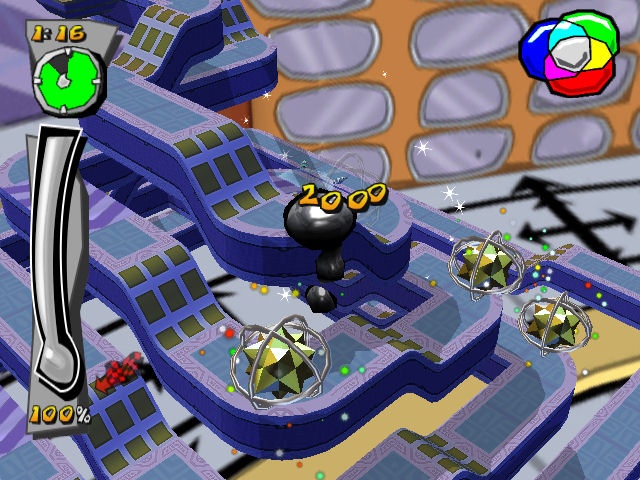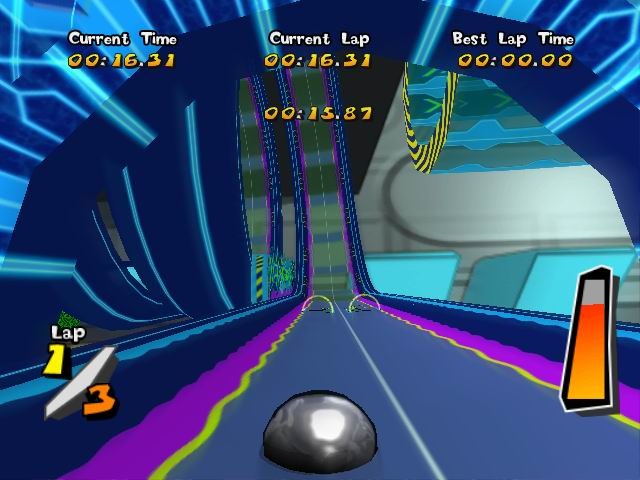Not long after the PSP was launched, a quirky, offbeat puzzler by the name of Mercury came out. The premise wasn't too far off the path beaten from games like Marble Madness and Super Monkey Ball, but because the usual ball was replaced with a blob of gelatinous mercury, all sorts of new challenges and potential hazards presented themselves. While it looked like a mere tech demo, Mercury proved to be one of the most addictive and challenging games of the PSP's initial run of games--emphasis on "challenging." A sequel in Mercury Meltdown hit the PSP just a couple of months ago, and now that sequel is appearing on the PlayStation 2 in "remixed" form. Remix, in this case, refers to the addition of a few new worlds and stages--it also happens to refer to a removal of all multiplayer support, an analog control scheme that makes the game markedly less challenging, and visuals that, while crisp and colorful, don't hold up nearly as well on a TV as they did on the PSP's screen. There's still an undeniably fetching puzzler to be found in Mercury Meltdown Remix, but it's hardly the ideal way to play the game.

Functionally, Mercury Meltdown Remix doesn't mess with the original game's formula. You are still presented with a blob (or in some cases, blobs) of mercury at the beginning of each stage and given the task of getting the blob to a finish line that is hidden somewhere along the way. You move said blob or blobs by tilting the world itself, which you do simply by moving the left analog stick in the desired direction. As you progress, you'll find a gaggle of traps, pitfalls, narrow ledges, color-coded switches and gates, and other unpleasant things that prevent you from getting to your destination. To circumvent these things, you'll have to do everything from splitting your blob into multiple pieces to coloring it/them and combining it/them into new colors. And in a new addition to this year's game, you'll periodically have to change the density of your mercury by heating it, cooling it, or turning it rock solid into some kind of crazy pinball.
On the PSP, Mercury Meltdown tempered its predecessor's difficulty level a decent bit. More than anything else, it balanced it out and spread the difficulty over a wider, more manageable playing field. Still, it was quite a challenging PSP puzzler. However, a decent chunk of that challenge is tempered even further in the PS2 version. Part of it has to do with control. The analog stick on the PSP doesn't move with as much precision as the analog sticks on the PS2 controller. However, Mercury Meltdown worked well on the PSP because it was built with that PSP stick in mind. On the PS2, nothing has been done to adjust the sensitivity, so it's way easier to tilt the world around without screwing up. Some of the later stages (especially the new ones) are still considerably challenging, just because of how utterly labyrinthine their solutions tend to be, but purely from a physical movement standpoint, this version is significantly less challenging.
Again, though, you'll still find yourself periodically wanting to grind your teeth down to a nub while playing Mercury Meltdown. Like the first game, it's one of those puzzle games that demand a lot of precise action and careful planning to be successful. One wrong move, and your entire blob will go sailing off the edge of the world, forcing you to restart. On the plus side, you're not relegated to only a few stages from the get-go, and unlocking more stages isn't an overly tough process. Stage unlocks are tiered specifically to the amount of mercury you build up at the end of each stage. These amounts build up over time, and once you fill the meter to the top, a new world unlocks. Remix includes more than 200 stages to play through, which is quite a few more than were available on the PSP. Though some enemies, pitfalls, and gimmicks repeat, each individual stage is unique in its own way, and the game never really gets bogged down by repetition. Those who played the game on the PSP will be a touch disappointed to discover that you have to play through pretty much all of the stages you already completed to get to any of the new content, and the odds of you wanting to do those stages all over again aren't good.
The rest of the changes to Remix go back to the controls, and these updates work fine with the PS2 controller--but again, they display how little thought went into this version. The right analog stick moves the camera, but it's not dynamic. Every time you tap the stick in one direction or another, it turns the camera 90 degrees in that direction, so you're still limited to chunks of camera movement, rather than a more free-form camera. This works fine, but if you're going to map camera control to an analog stick, you might as well go the whole way with it. Beyond that, R2 and L2 cycle through different blobs' camera focuses if you have multiple ones going, and R3 changes between single- and multi-blob camera modes.
Remix axes out the multiplayer functionality found in the PSP game, yet it still includes all of the unlockable party games. The party games are an interesting spin on the main formula and include a Tetris-type puzzle game, a racing game, a curling game, and more. Some are better than others, with Metrix--the Tetris-looking game--probably the best of the bunch. You're presented with a game board that includes multiple open squares you can fit puzzle pieces on. You create puzzle pieces by selecting from a series of three colored blobs and placing them in the positions you desire. If you line up three blobs of the same color on the game board, those blobs will disappear. It's not the most original thing in the world, but it's a nice little diversion. Other modes, like the race mode, are less engaging. Races don't require much effort beyond periodically turning your blob and making sure it steers through the speed burst icons on a track. Tracks themselves are fairly repetitive, and there's very little to do in a race. The biggest issue with these games is the lack of multiplayer. They weren't good for more than a quick distraction without a friend to play against on the PSP, and with that option simply removed from the PS2 game, you'll be over and done with them quickly.

There's no doubt that Mercury Meltdown was a great-looking PSP game, but when those same graphics are blown up on a TV screen and running on PlayStation 2 hardware, it's hard to be terribly impressed by them. The game retains its colorful, cartoony look, and the blob still moves and deforms in some very impressive ways, but the overall look just doesn't compare with the bulk of most PS2 titles. The stages look too simple to be impressive, and they all seem small and short when played on a console. Granted, that's because this was originally a handheld game, designed for play in short bursts, but that doesn't fly as well, here. At least the frame rate is near flawless, and the load times are almost nonexistent. The audio is functionally the same, as well. The soundtrack's extremely cheery tunes sound clearer now, but it's questionable whether that makes them better. Still, the music's not offensive, and the sound effects are enjoyable enough.
Making a Mercury game for the PlayStation 2 sounds like it could be a really good idea, but simply taking a game already released on the PSP, throwing in a bagful of leftover levels, failing to adjust the control design to make them more suitable for the new controller, and then charging $10 more than what the superior PSP game already costs is not the way to do it. Of course, because the basic puzzle designs contained within are so good, Remix still makes for a good time, but if you have the choice between playing Mercury Meltdown on the PSP and the PS2, stick to the handheld version.